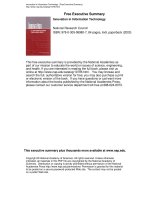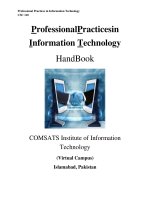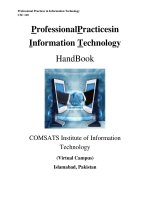Lecture Note Professional practices in information technology - Lecture No. 28: Intellectual property(Cont’d)
Bạn đang xem bản rút gọn của tài liệu. Xem và tải ngay bản đầy đủ của tài liệu tại đây (293.13 KB, 9 trang )
Professional Practices in Information Technology
CSC 110
Professional Practices in
Information Technology
HandBook
COMSATS Institute of Information
Technology
(Virtual Campus)
Islamabad, Pakistan
Professional Practices in Information Technology
CSC 110
Lecture 28
Intellectual Property (Cont’d)
28.1 Who Owns It?
Depends on the circumstances of the Project, nature of funding and the policies of the institution
– Grant – Institution should own
– Collaboration – Each should own IP it creates
– Service contract – Sponsor should own
Regardless of inventor/institution policy, in the IP clause it is better to have ownership vest in
Institution in the first instance
If you are giving up ownership of IP in agreement make sure you own it in the first place.
I am paying for it so I should own it...
In a collaborative research project a sponsor is never paying the full cost of the research.
Overhead alone do not account for the resources that the institution is bringing to the project
(including the PI’s expertise and often matching funding). In a collaborative project the parties
are working together and thus should both benefit from the results.
Ownership in a Collaborative Project
– Company shall own all Foreground Intellectual Property conceived entirely by Company
personnel (“Company IP"). University shall own all Foreground Intellectual Property
Professional Practices in Information Technology
CSC 110
conceived entirely by University personnel ("University IP"). The Parties shall jointly own
any Foreground Intellectual Property conceived of by at least one individual employed by
Company and at least one individual within the University (“Joint IP”).
– Each Party agrees to disclose promptly to the other Parties any and all Foreground
Intellectual Property created by or on behalf of that Party under the Project to the other
Parties regardless of whether or not capable of protection by patents, copyrights, industrial
designs or design patents.
Grant of Rights
– What rights of use that are given to the sponsor (or institution) again depends on the nature of
the project, the type of funding and the policies of the institution
– A license is the right of the party to use the IP. Can be limited by field, duration,
geographical area, or exclusivity
– An exclusive right means that the only person that can use the IP is the licensee – even to the
exclusion of the owner
– Grant of rights should be given as a time limited option. The length of time depends on the
nature of the IP & industry.
– Try to avoid setting royalty rates in the research agreement
– Once Sponsor turns down option you should have freedom to deal with IP as you see fit.
Retained Rights
– If you do not own the IP or are granting an exclusive right to use the IP to someone then you
Professional Practices in Information Technology
CSC 110
need to retain the right to use the IP for your researcher.
– This would include the right to use the IP for research, teaching, publication purposes
– Be aware of how giving up ownership of IP affects the rest of the agreement, particularly the
publication clause and confidentially clause
Right to assign IP to Inventors
– The University may assign all right, title and interest which the University may in the future
have in University IP and Joint IP to the University inventors according to the University’s
Inventions Policy and to the terms and conditions of this Agreement.
Indemnity/Liability
– Important not to be responsible for use of the IP by the sponsor
– Indemnity:vThe Company shall indemnify and save harmless the University ..... Against
all ... claims ... resulting from the use by the Company or its affiliates, its customers or
licensees of any deliverable or intellectual property developed by the University or the
Company under this Agreement.
Limitation of Liability
– The INSTITUTION shall not be liable for any direct, indirect, consequential, or other
damages suffered by the SPONSOR or any third party resulting from the use of the Data or
Intellectual Property developed under this Agreement, Protocol and Clinical Trial, except to
the extent such damages arise from the negligence or wilful misconduct of the
INSTITUTION. The entire risk as to the use of the Data and Intellectual Property and the
Professional Practices in Information Technology
CSC 110
design, development, manufacture, offering for sale, sale or other disposition and
performance of all products incorporating same, including but not limited to the Study Drug,
is assumed by the SPONSOR.
Duration of protection
– Life + 50
– 50
– 20
– 15
– 10
– Payment of statutory fee
Ownership
– Who is the owner?
– Proper plaintiff rule
Employer and employee relationship
Independent contractor
Government employee
Jointownership
Professional Practices in Information Technology
CSC 110
– Commissioned works
Exclusive rights
– To control the whole or a substantial part of the work.:
– The reproduction in any material form
– The communication to the public
– The public performance, showing or playing
– Distribution by sale or other transfer
– Commercial rental to the public
The exception to the exclusive right
– Fair dealing exception
– Statutory exception under section 13(2)
– Temporal (duration)
– Geographic
– Nonmaterial works
Professional Practices in Information Technology
CSC 110
– Compulsory licenses
Enforcing IP rights
– Civil action
– Criminal prosecution
– Cost in litigation
– Assistance from Enforcement Division
– Being vigilant/ self help
Civil action
– Starting a civil action
– Advantages
– Liability for cost
– Monetary compensation in term of damages
Criminal prosecution
– Making a complaint
Professional Practices in Information Technology
CSC 110
– Police or enforcement division
– Cost borne by the government
– No monetary compensation
– Remedy in term of fines or imprisonment for the offender
IP infringement
– Primary infringement
Who does or causes
Making the product
– Secondary infringement
Commercial activities
Selling, distribution for sale etc
Secondary infringement
– sells,lets for hire or by way of trade exposes or offer for sale or hire any infringing copies.
– Distribute infringing copies.
– Importing into the country
Commercialization
Professional Practices in Information Technology
CSC 110
– Assignment
– Licenses
– Exclusive
– Nonexclusive









